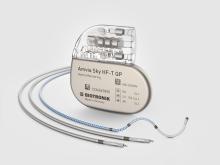What is Heart Failure?
Heart failure occurs when the heart muscle is weakened and does not pump blood as well as it should. Sometimes referred to as congestive heart failure, it means that the heart fails to pump enough oxygen-rich blood to meet the body’s needs. In patients with a weakened heart muscle, blood often backs up and fluid can build up in the lung, legs and other tissues throughout the body. Heart failure can persist for weeks, months or years (chronic) or can start suddenly (acute).



